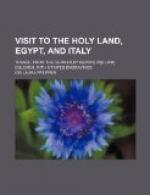In the market and the squares we notice a great preponderance of the male sex over the female. The former are seen bustling about every where, and, like the Italians, perform some duties which usually fall to the lot of the softer sex. We notice a mixture of the most different nations, and among them a particularly large number of Jews.
The bazaar is overloaded with southern fruits of all kinds. Oranges and lemons are seen here in great numbers, like the commonest of our fruits. The prices are of course very trifling. The cauliflowers brought from Asia Minor are particularly fine. I noticed many as large as a man’s head.
In the evening I was required to repair to the harbour and re-embark.
It is almost impossible to form an idea of the confusion which reigns here. A wooden railing forms the barrier between the healthy people and those who come from or intend travelling to a country infected with the plague. Whoever passes this line of demarcation is not allowed to return. Soldiers, officers, government officials, and superintendents, the latter of whom are armed with sticks and pairs of tongs, stand at the entrance to drive those forcibly back who will not be content with fair words. Provisions and other articles are either thrown over the barrier or left in front of it. In the latter case, however, they may not be touched until the bearers have departed. A gentleman on the “plague” side wished to give a letter to one on the other; it was immediately snatched from his hand and handed across by means of a pair of tongs. And all this time such a noise and hubbub is going on, that you can scarcely hear the sound of your own voice.
“Pray hand me over my luggage!” cries one. “Keep farther away! don’t come near me, and mind you don’t touch me!” anxiously exclaims another. And then the superintendents keep shouting—“Stand back, stand back!” etc.
I was highly entertained by this spectacle; the scene was entirely new to me. But on my return, when I shall be one of the prisoners, I fear I may find it rather tedious. For this time I was not at all hindered in the prosecution of my journey.
On the whole, these timid precautions seemed to me exceedingly uncalled for, particularly at a time when neither the plague nor any kind of contagious disease prevailed in Turkey. One of my fellow-passengers had been banished to our ship on the previous day because he had had the misfortune to brush against an official on going to see after his luggage.
At seven o’clock the tattoo is beaten, the grating is shut, and the farce ends. We now repaired to the fourth and last steamer, the Ferdinand. From first to last we changed vessels six times during a journey from Vienna to Constantinople; we travelled by four steamers and twice in boats; a circumstance which cannot be reckoned among the pleasures of a trip down the Danube.




